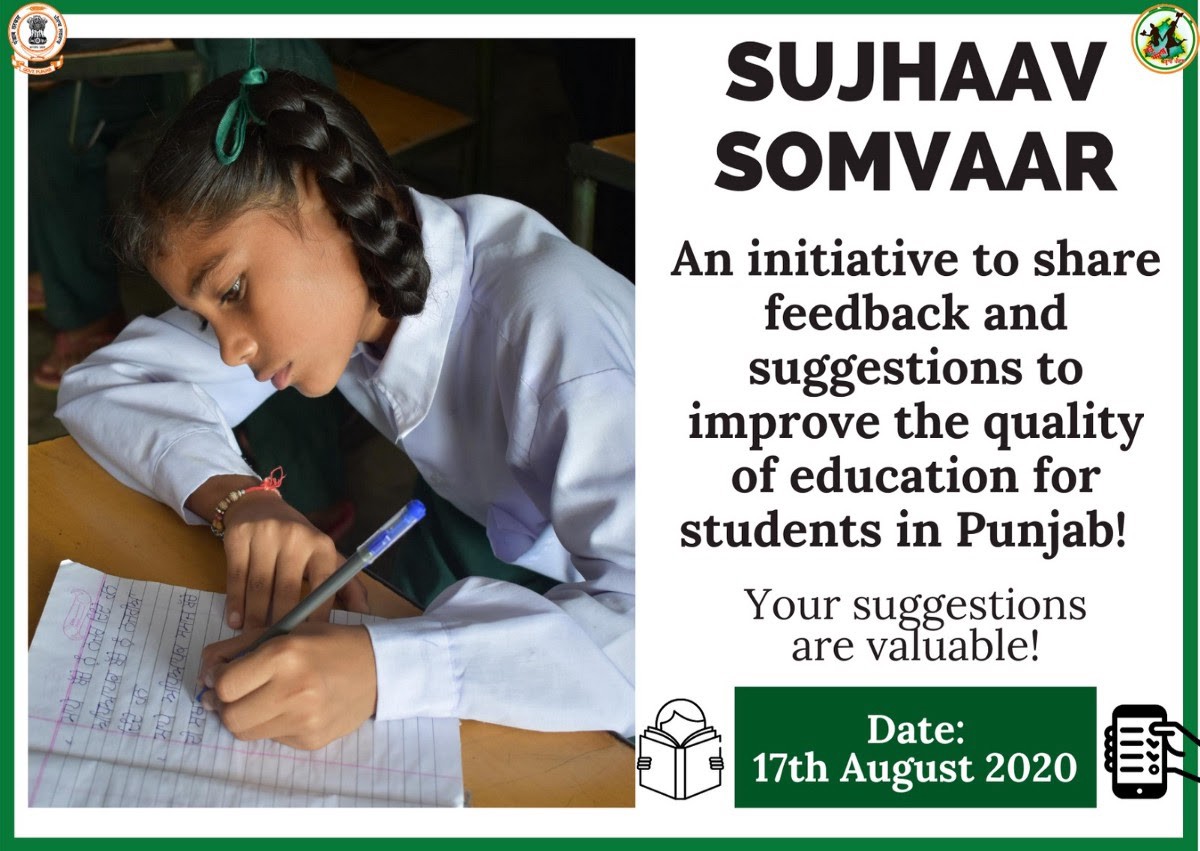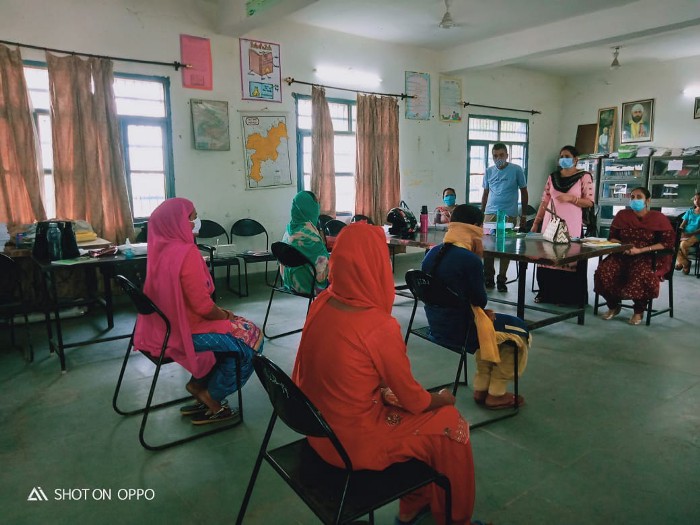Our approach
Our approach is designed to bring long term, sustainable, systemic change


Our program focuses upon achieving the following outcomes under 5 areas of fostering participatory governance in public education
Improving engagement between parents and teachers
- Increased frequency, attendance of parents in PTMs
- Improved quality of discussions between parents & teachers
Conducting effective SMC elections
- Improved participation of parents in SMC elections
- Improved awareness of parents about SMC & its role in school development
- Increased number of schools where SMC elections are conducted effectively
Conducting effective SMC trainings
- Improved awareness of SMC members about their role
- Improved belief of school staff in activation of SMCs
Improving the quality of SMC meetings
- Increased frequency & attendance in SMC meetings
-
Improved quality of discussions in SMC meetings
Setting up/Improving grievance redressal mechanism to address issues raised by SMCs
- Improved awareness/Setting up of grievance redressal mechanism
- Improved process of raising & addressing the grievances of SMCs
OUR REACH

Punjab (2019-present)
Samarthya as a part of the Punjab Education Collective consults with the Department of School Education, Punjab. The role of Samarthya in the collective is to strengthen school community relations across the 19000+ government schools of Punjab.
Madhya Pradesh (2019-2020)
In 2019 and 2020 Samarthya partnered with SRIJAN to support the women leaders of Federations in Shivpuri, Mokkhed and Chhindwara in Madhya Pradhesh in identification of, building alignment on and attempting to solve their most pressing issues faced by the local public.
Delhi (2016-2019)
Samarthya has worked directly with 12 school in the North East Region of Delhi. Currently Samarthya is a part of the SMC cell constituted by Delhi Commission For Protection of Child Rights.
Nagaland (2022-present)
Hover text- Since 2022, Samarthya is working on providing technical support on strengthening governance and capacity building for government schools in Nagaland, as part of Nagaland Enhancing Classroom Teaching and Resources (NECTAR), funded by the International Bank for Reconstruction and Development (IBRD).
Haryana (2018-present)
Partnered with the Haryana School Shiksha Pariyojna Parishad to improve parental participation in public education in the state.
Past Projects
NAGALAND (2022-PRESENT)
Since 2022, Samarthya is working on providing technical support on strengthening governance and capacity building for government schools in Nagaland, as part of Nagaland Enhancing Classroom Teaching and Resources (NECTAR), funded by the International Bank for Reconstruction and Development (IBRD). The project development objective for NECTAR is two fold: (i) enhance the governance of schools across the state; and (ii) improve teaching practices and learning environments in selected school complexes This project envisages to directly benefit about –
1,50,000 students in Government schools in Nagaland.
20,000 teachers, including School Heads.
100 District and Sub-District officers Members of around 1900 SMC/SMDCs
Nagaland Education Project seeks to improve community ownership and engagement in the management of Government schools . The active participation of the community through School Management Committees (SMCs) / School Management and Development Committees (SMDCs) is one of the key factors in the performance of Government schools and improvement of learning environment. Therefore, in order to strengthen their capacities, the project aims to give financial support to eligible SMCs and SMDCs across the state. This financial support is called Performance Incentive Grants (PIG). Samarthya assists in the design and delivery of the PIG initiative by conducting trainings and workshops for various stakeholders at the district and school level. We conduct capacity building workshops for schools to help them submit applications or/and proposals to obtain grants under the PIG initiative and to increase awareness of the roles and responsibilities of SMC members.
Highlights
1. As on June 2023, approximately 29 crore (INR) has been disbursed to around 1700 schools across Nagaland. Samarthya assists schools to submit applications to obtain these grants.
HARYANA (2018-PRESENT)
Highlights
1. 14000+ SMCs across the state use the SMC training module launched by the Haryana Education Department. We assissted the state government in drafting this module and undertaking trainings for various stakeholder groups
2. 2640 SMC members from 220 schools participated in the launch event of this training module
Sonipat
1. We supported the community with ration needs and vaccination awareness during the COVID pandemic
2. We supported SMC with enrollment campaigns after schools were re-opened post-COVID.
3. More than 70% of grievances were redressed across all schools we worked with
4. 100% of SMC members were aware of atleast three responsibilities of an SMC , 97%of the members are aware of at least 3 ways of identifying issues in the school.
5. 60% average parent attendance in PTMs was observed in most schools
Karnal
1. 90+ school principals have been trained on conducting PTMs
PUNJAB (2019-PRESENT)
Highlights
1. The Punjab Education collective is setting benchmarks in collaborative implementation with the collective crossing the 3-year mark in 2022
2. The state of Punjab has shifted from doing 2 PTMs in a year to 2 PTMs every quarter. We are heading towards institutionalization of this initiative, where state actors are taking the initiative and responsibility of planning and implementation
DELHI (2016-2019)
MADHYA PRADESH (2019-2020)
Adapting To COVID

Sujhaav Somvaar:
Sujhaav Somvaar , an initiative started by Department of School Education, Punjab with our support was designed to improve the process of consultation by the department. It was dedicated to hearing voices from stakeholders. For those designing and planning initiatives, it allows them to collect feedback each week on an initiative on a single platform. For other stakeholders, be it teachers/ education officers who implement department initiatives or be it students/ parents who are key beneficiaries. it allows them to register their suggestions & feedback.
Virtual PTMs:
While the need for increasing participation of parents in education of their children was always felt, the school closure due to pandemic made everyone act on it in multiple ways. In our work, it enabled a space for parents to express the need for their active participation in their child’s learning and teachers to see the importance of keeping the parents informed and supporting them. Understanding the integral role that parents play in the overall development of the child and school, especially at this time, we worked with the Education department in Punjab to design and conduct parents teacher meetings virtually almost every month, to not just keep the connection between teachers and parents intact but also brought them comfort and a feeling of being heard by the staff. Frequency of these PTMs increased 4 times compared to the previous year coupled by the increase in the number of parents whom teachers were able to interact with by at least 30%.
Ration Support:
Lockdown due to pandemic lead to complete loss of income for most the parents we work with . It lead to inability of parents to put food on the plate for themselves and their children, hence affecting their nutrition as well their access to learning. Funds were raised to provide 650+ ration kits to the families living in Sonipat(Haryana) & Pali (Rajasthan). to support them till the time they were able to start earning again. Funds received were directly transferred to the shop owners who were providing rations kits to families who needed the same.

